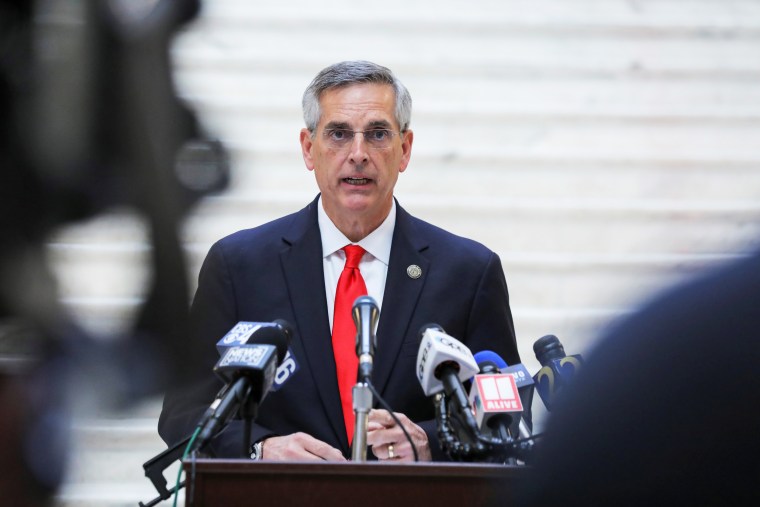WASHINGTON — Critics of Georgia’s new election law have focused on the new voter ID requirements, its ban on giving water and food to voters waiting in line, and its shortened timeframe for any runoff.
But the law also contains a less-noticed but much more controversial — and even radical — provision.
It curtails the authority of local elections officials and the state’s elected secretary of state — even though all of them performed their duties in 2020, and even though Secretary of State Brad Raffensperger resisted Donald Trump’s plea to find him 11,780 votes so he could carry the state.
The Georgia law creates a new chair of the State Election Board (who would assume power previously held by the secretary of state); it eliminates the secretary of state’s role as a voting member of the state election board; and it grants additional power for the state board to suspend county election officials.
And it’s not just Georgia that’s attempting strip power from local elections officials and secretaries of state.
Iowa passed a measure threatening county auditors with criminal prosecution or fines for failing to follow new rules, and the law also places new limits on local officials’ authority to set up satellite early voting locations
In Texas, there are at least six measures moving through the legislature that restrict the power of local elections officials or threaten them with fines. Local elections officials could also be legally prohibited from sending unsolicited absentee ballot applications
And in Michigan, some proposed changes would overhaul large counties’ canvassing boards and prohibit the secretary of state from sending out unsolicited absentee ballot applications.
Our question: If there was no widespread fraud in 2020, and if these local elections officials and secretaries of state performed their duties, why are these laws and bills punishing them?
Tweet of the day
A green light — then a red light — for Biden’s infrastructure bill
The Biden White House and congressional Dems got good news on their infrastructure bill on Monday: The Senate parliamentarian told Senate Majority Leader Chuck Schumer that budget rules would allow him to use reconciliation an additional time, per NBC’s Capitol Hill team.
In other words, they can pass their infrastructure bill with just 51 votes and bypass a GOP filibuster.
But they also got bad news yesterday: Sen. Joe Manchin, D-W.V., said he opposes the bill raising the corporate tax rate to 28 percent to pay for infrastructure; he said he instead prefers a 25 percent rate.
Data Download: The numbers you need to know today
2013: The first year that Colorado — where the MLB All Star game has reportedly been relocated — began offering universal mail balloting.
More than $1.8 million: The amount raised in the first quarter by Virginia Democratic gubernatorial candidate Jennifer Carroll Foy.
30,921,843: The number of confirmed cases of coronavirus in the United States, per the most recent data from NBC News and health officials. (That’s 78,271 more than yesterday morning.)
561,235: The number of deaths in the United States from the virus so far, per the most recent data from NBC News. (That’s 526 more than yesterday morning.)
167,187,795: Number of vaccine doses administered in the U.S.
17.5 percent: The share of Americans who are fully vaccinated.
23: The number of days left for Biden to reach his 100-day vaccination goal.
We’re jabbin’; I want to jabbin’ with you
At 1:45 p.m. ET, President Biden visits a vaccination site at Virginia Theological Seminary in Alexandria, Va. And then he returns to the White House, where he gives a speech at 3:45 p.m. ET on the state of the United States’ vaccination efforts.
NBC’s Peter Alexander reports that Biden is expected to announce: 1) that states should make all adults eligible for a Covid vaccine by April 19, moving up his previous deadline by two weeks; and 2) that the U.S. has reached 150 million vaccine doses in his first 75 days as president.
Vice President Harris also tours a vaccination site today in Chicago.
It’s Debate Night in Virginia
Tonight beginning at 7:00 p.m. ET, the five Democratic candidates running for Virginia governor — former Gov. Terry McAuliffe, Lt. Gov. Justin Fairfax, state Sen. Jennifer McClellan, former state Del. Jennifer Carroll Foy and state Del. Lee Carter — will participate in their first party-sanctioned debate.
The debate takes place at Virginia State University in Petersburg, Va., and Richmond’s CBS affiliate is broadcasting the debate, which will air across the state.
ICYMI: What else is happening in the world
“Vaccine passports” are becoming increasingly politicized. Experts warn it could make vaccine hesitancy among Republicans even worse.
Matt Gaetz says he’s “absolutely not” resigning. (But Trump and his allies aren’t exactly leaping to his defense.)
The GOP governor of Arkansas has vetoed legislation that would ban medical treatment for transgender youths.
The next big fight is over infrastructure. But what exactly does “infrastructure” mean?
Here’s the latest on political developments in Israel, where Benjamin Netanyahu will try to cobble together a governing majority.
Eric Bolling won’t run for Congress in South Carolina after all.



